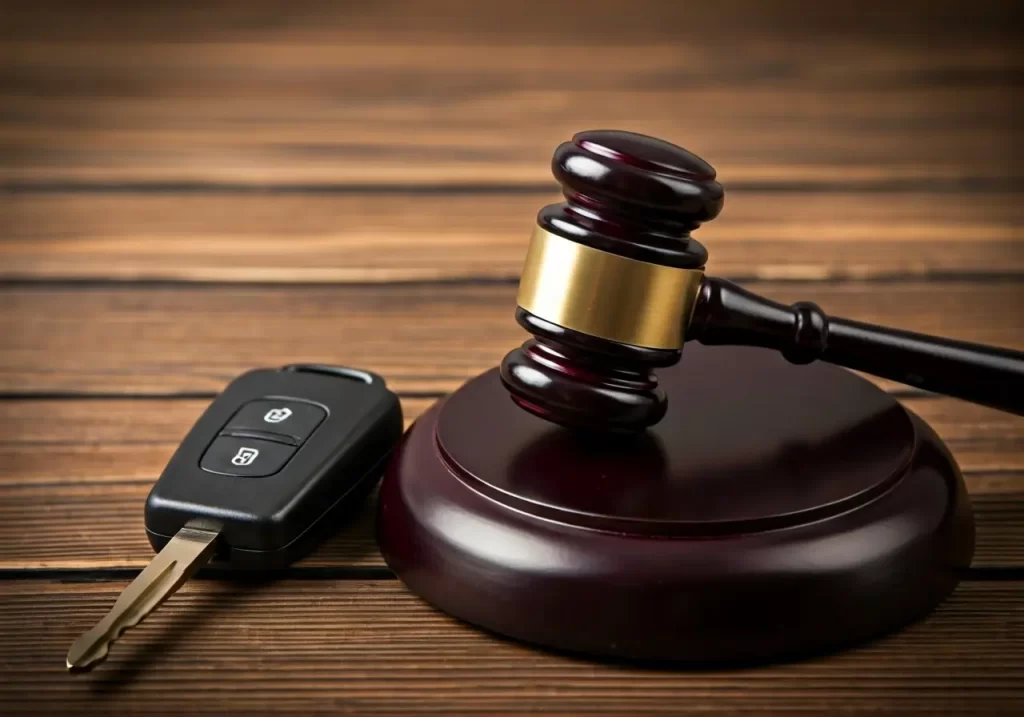Navigating NJ DUI laws can be daunting, especially if you’re a first-time offender. This blog aims to break down the laws, penalties, and steps involved in dealing with a first-time DUI charge in New Jersey. Let’s explore how these laws impact you and what you can expect.
What Constitutes a DUI in New Jersey?
In New Jersey, a DUI (Driving Under the Influence) charge is issued if you operate a vehicle with a blood alcohol concentration (BAC) of 0.08% or higher. This rule is standardized to ensure that all drivers understand the threshold that puts them at risk. It’s essential to note that New Jersey’s DUI laws also cover driving under the influence of drugs, whether these are illegal substances or prescription medications that impair your ability to drive.
It’s not just alcohol that can land you with a DUI. New Jersey DUI laws are broad, aiming to keep all impaired drivers off the road. This means that even legal, prescription medications can result in a DUI if they impair your driving. For example, many strong painkillers, anxiety medications, and even sleep aids can reduce your ability to operate a vehicle safely. It’s critical to understand how any medication you take might interact with your ability to drive.
Immediate Consequences of a First-Time DUI Arrest
When you are arrested for a first-time DUI in New Jersey, several immediate consequences follow. The police may suspend your driver’s license on the spot. Additionally, your vehicle will likely be impounded, and you’ll need to arrange for its release, often requiring payment of fines. Beyond these inconveniences, you will be mandated to participate in the Intoxicated Driver Resource Center (IDRC) program, which is a critical step in addressing and reducing future instances of drunk driving.
In addition to the immediate loss of driving privileges and vehicle impoundment, you may be required to submit to various tests and evaluations. These assessments aim to determine if you need further treatment beyond the IDRC program. Complying with all requirements is crucial, as failure to do so can lead to further legal complications.
Another immediate consequence includes facing a summons. The summons will lay out specific dates for court appearances and other legal obligations. Missing these court dates can result in additional penalties, so it’s essential to keep track of all required appearances and obligations.
Legal Penalties for First-Time DUI Offenders
First-time DUI offenders in New Jersey face a range of legal penalties. These can include monetary fines ranging from (250 to )400, which can escalate depending on various circumstances, such as high BAC levels. The court may also impose jail time of up to 30 days, although this is typically reserved for more severe cases or situations where the DUI resulted in an accident or injury.
In addition to the fines and possible jail time, first-time offenders can also expect other financial penalties, such as a $1,000 yearly surcharge for three years. This fee is a significant burden and underscores the long-term financial impact of a DUI conviction. Penalties may also vary based on your BAC level and whether you have committed any other traffic violations simultaneously.
Interestingly, in some cases, New Jersey legislators have aimed to modify the penalties to be more effective. For example, proposals have suggested changes in license suspension periods and fines to focus more on rehabilitation and preventing repeat offenses. Such measures indicate that the legal landscape for DUI in New Jersey can evolve, emphasizing the importance of staying informed.
Mandatory Programs and Treatments
For first-time DUI offenders, attending the Intoxicated Driver Resource Center (IDRC) program is mandatory. This program includes both an alcohol and traffic safety education course and an evaluation to determine if further treatment is needed. The primary aim of these programs is to educate offenders about the dangers and consequences of impaired driving and to prevent future violations.
The IDRC program involves a structured schedule that can last from 12 to 48 hours, spanning several days. During this time, you’ll engage in educational sessions and undergo assessments by trained professionals. If further treatment is deemed necessary, you may be referred to additional substance abuse programs. It’s worth noting that failing to comply with these program requirements can result in additional penalties, including extended license suspension or even jail time.
The costs associated with these mandatory programs can also be considerable. Besides the program’s fees, there are additional charges for any required treatments and follow-up sessions. It’s important to budget for these expenses as part of the broader financial impact of a DUI charge.
Legal Representation and Defense Strategies
Choosing to hire an experienced DUI attorney can significantly impact the outcome of your case. Legal professionals who specialize in DUI cases can help you understand your rights and navigate the complexities of NJ DUI laws. They might challenge the validity of the traffic stop, the administration of field sobriety tests, or the accuracy of breathalyzer results.
Defense strategies vary, but a common approach involves scrutinizing the evidence against you. An attorney might question the calibration and maintenance records of the breathalyzer used during your arrest. If there were any procedural errors, such as mistimed administration, this could serve as a viable defense.
Consulting with a DUI lawyer at the earliest opportunity is often recommended. A skilled attorney can guide you through deciding whether to plea bargain or take your case to trial. They can also represent you in court, ensuring that you have the best possible chance for a favorable outcome.
It’s vital to remember that legal representation can make a difference in reducing penalties or even dismissing charges. The sooner you get an attorney involved, the better your chances of mitigating the severe consequences of a DUI conviction.
Steps to Reinstate Your Driver’s License
Once you’ve served any imposed license suspension period, reinstating your driver’s license in New Jersey involves several important steps. First, you must complete all court-imposed requirements, such as attending the IDRC program and any additional treatments. Failing to meet these requirements can delay or prevent your ability to get your license back.
Next, you’ll need to pay the reinstatement fee, which is another added cost stemming from a DUI conviction. Be prepared to also cover any additional surcharges that might be levied by the court. Only after these financial and educational obligations are met can you apply to have your driving privileges reinstated.
Understanding the specific administrative procedures involved in reinstating your driver’s license is crucial. It often includes filling out the required paperwork, which can be detailed and rigorous. Ensuring you have completed every part of the process correctly will prevent further delays, allowing you to return to the road legally.
Also, remember the importance of demonstrating a commitment to safe driving practices. Continuous violations or failing to adhere to the court’s requirements can result in further complications, making it even harder to reinstate your license.
Tips for Avoiding Future DUI Offenses
Avoiding future DUI offenses requires adopting responsible drinking habits and planning ahead. One effective strategy is to designate a sober driver before heading out for the evening. If no one in your group is willing to abstain from drinking, consider arranging for a taxi or ride-sharing service.
Another proactive measure is to be mindful of your alcohol intake. Understanding how different beverages and quantities affect your BAC can help you make more informed decisions. Utilizing personal breathalyzers can provide real-time insights into your sobriety levels, although they are not a substitute for professional testing devices.
Emphasizing safe driving practices overall is paramount. This not only involves being mindful about alcohol and medication but also adhering to traffic rules and avoiding risky behaviors. Remember, impaired driving endangers not just your life but everyone else’s on the road too.
Ultimately, avoiding the repercussions of a DUI translates to a commitment to never drinking and driving. Reflecting on the severe penalties and costs associated with a DUI should reinforce the value of making responsible choices. Staying informed and proactive is your best bet for steering clear of such legal troubles.
Wrapping Up: Key Takeaways for First-Time DUI Offenders
Understanding NJ DUI laws for first-time offenders is crucial to navigate the legal process effectively. By knowing the penalties, attending required programs, and considering legal representation, you can better manage this challenging situation. Always remember to prioritize safe and responsible driving to avoid such circumstances.


